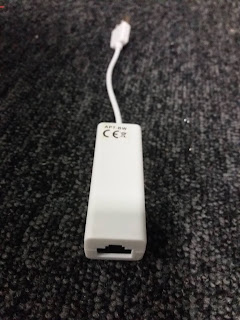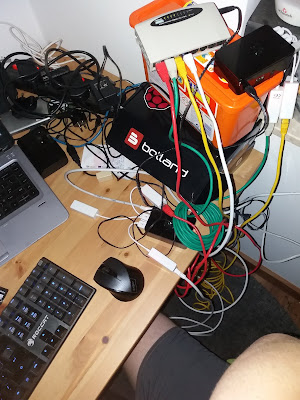Handling multiple identical USB ethernet adapters (Raspberry PI, udev)
You have to build simple ethernet-connected chain of devices and continuously check that it's healthy. In order to save money and time you decide to replace individual devices (say Raspberries) with multiple USB ethernet adapters. You buy Chinese ones. What could go wrong?
We're building an escape room. There's plenty of them in Wrocław but our is special, because it's dedicated for IT guys. Random people would have lot of trouble solving even first riddles. These riddles are supposed to be great fun for tech people.
I don't want to spoil what are the riddles. Let us stay with the technical problem that I had at hand. Multiple devices need to be accessible in some specific configuration to solve one of the riddles. It made no sense to have these devices if their only purpose was to respond to some ICMP packet (certainly there is even more low-level solution, but we need something easy and reliable now). We decided to limit number of these and to attach USB ethernet adapters to each. My colleague has bought some Chinese adapters like on picture below and problems emerged immediately.
BTW the funny fact about CE marks on some devices (I'm not sure about this one) may not actually be CE marks but "China Export". You can read more about it here.
Perfect hardware clones!
So what's the problem? Well... when I firstly plugged in first adapted I made some configuration changes in Raspbian and was happy that everything works flawlessly. However, couple of days after I connected second adapter to the same device and it was the time when the problem surfaced. All of these USB adapters had the same MAC address. To make it even worse, after inspecting what's in /sys, I was sure that all of the USB parameters are also identical. In other words these devices were perfect clones. ROM was the same for all of them! And btw one out of 8 was not working at all.
Why this is a problem? It's because if the names are the same, kernel will rename network interface name to something like rename{number} and there's no reliable way to tell which interface is connected to which cable. Sadly, they also share the same MAC, so if you connect all adapters to the same switch, funny things will start to happen!
Ubootdev for the rescue
I'm not that into Linux, but I immediately knew where to look for - udev. I was afraid that there won't be a way to differentiate between adapters at udev level and I was right.
However, some silly (maybe not silly. If something is silly but it works it means it's not silly ;-) solution is possible: differentiate USB ports rather than the devices themselves.
I started to read documentation and have found that you can create rules based on ports, like following:
SUBSYSTEM=="net", KERNELS=="1-2:1.0", ATTR{address}=="00:e0:4c:53:44:58"
net is the subsystem we want. USB port must be provided in KERNELS parameter (S at the end is both intentional and crucial). By providing address attribute you may further target only these Chinese adapters you have on the desk.
Finding out usb ports proved to be a little tricky task. You can do it using udevadm utility.
I have prepared diagram for my RPi 3:
Please take note that this may be different in your case. The reason is that it all depends on:
SUBSYSTEM=="net", KERNELS=="1-1.2:1.0", ATTR{address}=="00:e0:4c:53:44:58", NAME="kabelek1", RUN+="/sbin/ifconfig kabelek1 hw ether 00:e0:4c:00:00:01"
SUBSYSTEM=="net", KERNELS=="1-1.4:1.0", ATTR{address}=="00:e0:4c:53:44:58", NAME="kabelek2", RUN+="/sbin/ifconfig kabelek2 hw ether 00:e0:4c:00:00:02"
SUBSYSTEM=="net", KERNELS=="1-1.3:1.0", ATTR{address}=="00:e0:4c:53:44:58", NAME="kabelek3", RUN+="/sbin/ifconfig kabelek3 hw ether 00:e0:4c:00:00:03"
SUBSYSTEM=="net", KERNELS=="1-1.5:1.0", ATTR{address}=="00:e0:4c:53:44:58", NAME="kabelek4", RUN+="/sbin/ifconfig kabelek4 hw ether 00:e0:4c:00:00:04"
And voile-a! You are free to connect lot of adapters to single Raspberry. You still need to maintain USB-port and Ethernet cables coupling and also you will need to do something with the cables ;)
This is how my desk looked like when I was figuring things out.
To summarize, almost everything can be done and if something really can't, then you somehow can circumvent. However I believe this trick is just palliative. Chinese adapters can backfire any time, so if you require reliability, then you should look for other hardware.
We're building an escape room. There's plenty of them in Wrocław but our is special, because it's dedicated for IT guys. Random people would have lot of trouble solving even first riddles. These riddles are supposed to be great fun for tech people.
I don't want to spoil what are the riddles. Let us stay with the technical problem that I had at hand. Multiple devices need to be accessible in some specific configuration to solve one of the riddles. It made no sense to have these devices if their only purpose was to respond to some ICMP packet (certainly there is even more low-level solution, but we need something easy and reliable now). We decided to limit number of these and to attach USB ethernet adapters to each. My colleague has bought some Chinese adapters like on picture below and problems emerged immediately.
BTW the funny fact about CE marks on some devices (I'm not sure about this one) may not actually be CE marks but "China Export". You can read more about it here.
Perfect hardware clones!
So what's the problem? Well... when I firstly plugged in first adapted I made some configuration changes in Raspbian and was happy that everything works flawlessly. However, couple of days after I connected second adapter to the same device and it was the time when the problem surfaced. All of these USB adapters had the same MAC address. To make it even worse, after inspecting what's in /sys, I was sure that all of the USB parameters are also identical. In other words these devices were perfect clones. ROM was the same for all of them! And btw one out of 8 was not working at all.
Why this is a problem? It's because if the names are the same, kernel will rename network interface name to something like rename{number} and there's no reliable way to tell which interface is connected to which cable. Sadly, they also share the same MAC, so if you connect all adapters to the same switch, funny things will start to happen!
U
I'm not that into Linux, but I immediately knew where to look for - udev. I was afraid that there won't be a way to differentiate between adapters at udev level and I was right.
However, some silly (maybe not silly. If something is silly but it works it means it's not silly ;-) solution is possible: differentiate USB ports rather than the devices themselves.
I started to read documentation and have found that you can create rules based on ports, like following:
SUBSYSTEM=="net", KERNELS=="1-2:1.0", ATTR{address}=="00:e0:4c:53:44:58"
net is the subsystem we want. USB port must be provided in KERNELS parameter (S at the end is both intentional and crucial). By providing address attribute you may further target only these Chinese adapters you have on the desk.
Finding out usb ports proved to be a little tricky task. You can do it using udevadm utility.
I have prepared diagram for my RPi 3:
Please take note that this may be different in your case. The reason is that it all depends on:
- hardware revision
- firmware versions
- kernel version
- kernel modules version
- you can target using ATTR{address}=="mac-here", but apparently there's no way to change it (ATTR{address}="new-mac" doesn't work)
- changing MAC address is still possible (e.g. ifconfig <ifname> hw ether ...) and you can even use the name you set, but you must use absolute paths to executable!
SUBSYSTEM=="net", KERNELS=="1-1.2:1.0", ATTR{address}=="00:e0:4c:53:44:58", NAME="kabelek1", RUN+="/sbin/ifconfig kabelek1 hw ether 00:e0:4c:00:00:01"
SUBSYSTEM=="net", KERNELS=="1-1.4:1.0", ATTR{address}=="00:e0:4c:53:44:58", NAME="kabelek2", RUN+="/sbin/ifconfig kabelek2 hw ether 00:e0:4c:00:00:02"
SUBSYSTEM=="net", KERNELS=="1-1.3:1.0", ATTR{address}=="00:e0:4c:53:44:58", NAME="kabelek3", RUN+="/sbin/ifconfig kabelek3 hw ether 00:e0:4c:00:00:03"
SUBSYSTEM=="net", KERNELS=="1-1.5:1.0", ATTR{address}=="00:e0:4c:53:44:58", NAME="kabelek4", RUN+="/sbin/ifconfig kabelek4 hw ether 00:e0:4c:00:00:04"
And voile-a! You are free to connect lot of adapters to single Raspberry. You still need to maintain USB-port and Ethernet cables coupling and also you will need to do something with the cables ;)
This is how my desk looked like when I was figuring things out.
To summarize, almost everything can be done and if something really can't, then you somehow can circumvent. However I believe this trick is just palliative. Chinese adapters can backfire any time, so if you require reliability, then you should look for other hardware.




